List of National Historic Sites of Canada in Toronto
This is a list of National Historic Sites (French: Lieux historiques nationaux du Canada) in Canada's most populous city, Toronto, Ontario. There are 36 National Historic Sites in Toronto.[1] The first National Historic Site to be designated in the city was Fort York in 1923.[2][3]
National Historic Sites located elsewhere in Ontario are listed at List of National Historic Sites of Canada in Ontario, with additional breakout lists for some cities. These sites are part of a federal designation program that includes National Historic Events and National Historic Persons. Each is typically marked by a federal plaque. Certain sites are part of the national park system, administered by Parks Canada, though there are none in Toronto. Bead Hill National Historic Site, in eastern Scarborough, is slated to join the park system once Rouge National Urban Park is expanded to include that area.[4] It would become Toronto's only National Historic Site in the national park system.
This list uses names designated by the Historic Sites and Monuments Board of Canada, which may differ from other names for these sites.
National Historic Sites
| Site | Date(s) | Designated | Location | Description | Image |
|---|---|---|---|---|---|
| Annesley Hall [5][6] | 1903 (completed) | 1990 | Toronto 43°40′04″N 79°23′35″W / 43.66778°N 79.39306°W |
The first purpose-built women's’ residence on a Canadian university campus, and a good example of the Queen Anne Revival style in institutional architecture | |
| Balmoral Fire Hall [7][8] | 1911 (completed) | 1990 | Toronto 43°41′09″N 79°23′38″W / 43.685833°N 79.393870°W |
A rare example of the Queen Anne Revival style used for a fire hall | |
| Bank of Upper Canada Building [9][10] | 1825 (completed) | 1977 | Toronto 43°39′06.54″N 79°22′15.5″W / 43.6518167°N 79.370972°W |
An early 19th-century bank building, representative of the rise of Toronto as a commercial centre and the role played by the Bank of Upper Canada in the development of Upper Canada | |
| Bead Hill [11][12] | 1600s (village established) | 1991 | Toronto 43°48′14.77″N 79°8′24.4″W / 43.8041028°N 79.140111°W |
An archaeological site in Rouge Park with the only known intact remains of a 17th-century Seneca village in the country |  |
| Birkbeck Building [13][14] | 1908 (completed) | 1986 | Toronto 43°39′2.54″N 79°22′40.49″W / 43.6507056°N 79.3779139°W |
A four-storey office building typical of the premises of many financial institutions prevalent in central business districts of Canadian cities before the First World War; representative of a transitional building from that period which combined historical styles with (then) modern design and construction techniques | 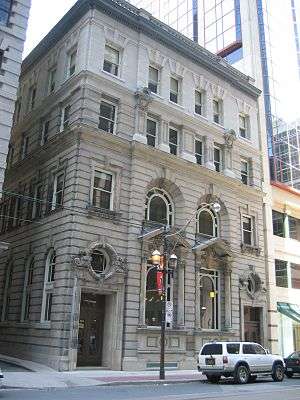 |
| Eaton's 7th Floor Auditorium and Round Room [15][16] | 1930 (completed) | 1983 | Toronto 43°39′39″N 79°23′00″W / 43.660929°N 79.383302°W |
A foyer, restaurant and auditorium, designed by French architect Jacques Carlu and muralist Natacha Carlu, located within the former Eaton's College Street department store; remarkable examples of Art Deco and Streamline Moderne interior design | |
| Chapel of St. James-the-Less Anglican Church [17][18] | 1861 (completed) | 1990 | Toronto 43°40′10.4″N 79°22′8.32″W / 43.669556°N 79.3689778°W |
The Chapel is a noted example of High Victorian Gothic Revival architecture and exemplifies the small chapels built in this style in Canada | 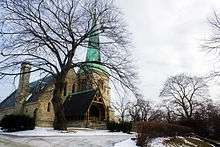 |
| Eglinton Theatre [19][20] | 1936 (completed) | 1993 | Toronto 43°42′15.96″N 79°24′38.66″W / 43.7044333°N 79.4107389°W |
A cinema representing one of the best examples of the Art Deco-style in Canadian theatre design | 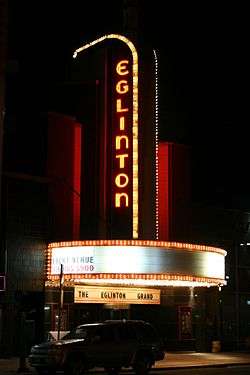 |
| Elgin and Winter Garden Theatres [21][22] | 1914 (completed) | 1982 | Toronto 43°39′11″N 79°22′45″W / 43.65306°N 79.37917°W |
A pair of stacked theatres built by renowned theatre-designer Thomas W. Lamb; originally built for vaudeville, they are the last remaining operational double-decker theatres in the world |  |
| Fort York [23][24] | 1793 (established), 1815 (current fort completed) | 1923 | Toronto 43°38′20.50″N 79°24′12″W / 43.6390278°N 79.40333°W |
The birthplace of the settlement that would become Toronto and the primary defence for (what was then) York, Upper Canada, the Fort now serves as a museum containing the largest collection of War of 1812 buildings in Canada and many of the oldest buildings in Toronto |  |
| Fourth York Post Office [25][26] | 1835 (completed) | 1980 | Toronto 43°39′06.65″N 79°22′14.34″W / 43.6518472°N 79.3706500°W |
Also known as the "First Toronto Post Office" (it was the fourth post office in York, but the first one to serve the settlement when it became Toronto in 1834), it is one of the earliest surviving examples in Canada of a building purpose-built as a post office; typical of small, early 19th-century public buildings, combining public offices and a private residence |  |
| George Brown House [27][28] | 1877 (completed) | 1976 | Toronto 43°39′21″N 79°23′42″W / 43.655825°N 79.39502°W |
The residence of George Brown, founder of (what is now) The Globe and Mail and a Father of Confederation; the site in Toronto most associated with the abolitionist movement and the Underground Railroad |  |
| Gooderham and Worts Distillery [29][30] | 1859 to 1927 (construction of extant distillery buildings) | 1988 | Toronto 43°39′2.628″N 79°21′35.17″W / 43.65073000°N 79.3597694°W |
Forty historic distillery buildings on a 13-acre site, representative of the history of the Canadian distilling industry and Toronto's industrial past | 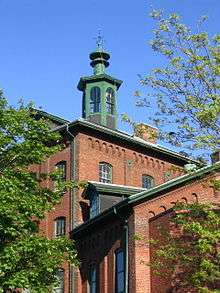 |
| Gouinlock Buildings / Early Exhibition Buildings [31][32] | 1904 to 1912 (completed) | 1988 | Toronto 43°37′58″N 79°24′58″W / 43.63278°N 79.41611°W |
Five buildings (the Fire Hall/Police Station, Government Building, Horticulture Building, Music Building and Press Building) on the grounds of the Canadian National Exhibition; the largest and finest group of early 20th century exhibition buildings in Canada |  |
| Heliconian Hall [33][34] | 1876 (completed) | 2008 | Toronto 43°40′19.03″N 79°23′36.04″W / 43.6719528°N 79.3933444°W |
Originally constructed as a church in Yorkville in the Carpenter Gothic style, the building has since 1923 served as a unique multidisciplinary arts club specifically for women | |
| John Street Roundhouse (Canadian Pacific) [35][36] | 1931 (completed) | 1990 | Toronto 43°38′27″N 79°23′09″W / 43.640862°N 79.385925°W |
Located in Toronto’s formerly vast railway lands near Union Station, it is Canada's best surviving example of a roundhouse; now occupied by the Toronto Railway Heritage Centre, the Steam Whistle brewery and a furniture store | |
| Kensington Market [37][38] | 1815 (first development (Bellevue Estate)) | 2006 | Toronto 43°39′17.18″N 79°24′02.44″W / 43.6547722°N 79.4006778°W |
A neighbourhood noted for its network of narrow streets and lanes fronted by rows of small houses and shops; since the early 20th century, it has been home to numerous successive waves of immigrant communities, making it a microcosm of Canada's multiculturalism | 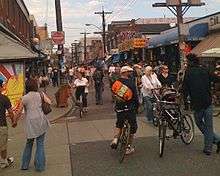 |
| Maple Leaf Gardens [39][40] | 1931 (completed) | 2007 | Toronto 43°39′44″N 79°22′49″W / 43.66222°N 79.38028°W |
Built for the Toronto Maple Leafs, the arena is regarded as of the most renowned "shrines" in the history of ice hockey; for 70 years, it was one of Canada's foremost venues for large-scale sporting events, concerts and political events | |
| Massey Hall [41][42] | 1894 (completed) | 1981 | Toronto 43°39′15″N 79°22′44.50″W / 43.65417°N 79.3790278°W |
A gift to the City of Toronto from wealthy industrialist Hart Massey, the concert hall has been one of the country's most important cultural institutions and is renowned for its outstanding acoustics | .jpg) |
| Metallic Roofing Company Offices [43][44] | 1897 (completed) | 1984 | Toronto 43°38′21.01″N 79°25′37.76″W / 43.6391694°N 79.4271556°W |
A unique Beaux-Arts style building decorated entirely in pressed metal; the building was dismantled in 1982 when the site was redeveloped, and it is held by the Ontario Heritage Trust for eventual reconstruction |  |
| Montgomery's Tavern [45][46] | 1837 (battle) | 1925 | Toronto 43°42′34″N 79°23′56″W / 43.7095°N 79.3990°W |
The site of an abortive insurrection by William Lyon MacKenzie during the Upper Canada Rebellion; the rebellion ultimately contributed to the establishment of responsible government in the colony | 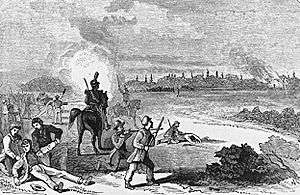 |
| Mount Pleasant Cemetery [47][48] | 1876 (opened) | 2000 | Toronto 43°41′47″N 79°23′06″W / 43.696351°N 79.384882°W |
An outstanding example of picturesque design inspired by the 19th-century tradition of rural cemeteries in a naturalistic setting; many of the grave markers are representative of significant epochs in the history of Toronto and the rest of the country | |
| Old Toronto City Hall and York County Court House [49][50] | 1899 (completed) | 1984 | Toronto 43°39′9″N 79°22′54″W / 43.65250°N 79.38167°W |
One of Canada’s finest examples of Richardsonian Romanesque architecture and a symbol of Toronto's prosperity and rapid urbanization in the late 19th century |  |
| Old Toronto Post Office / Old Bank of Canada [51][52] | 1853 (completed) | 1958 | Toronto 43°39′00″N 79°22′35″W / 43.64999°N 79.376355°W |
A noted example of Greek Revival architecture in Canada | |
| Osgoode Hall [53][54] | 1832 (original wing completed) | 1979 | Toronto 43°39′08″N 79°23′08″W / 43.65222°N 79.38556°W |
Housing the Law Society of Upper Canada, courts of law and, until 1959, the only law school in the province, Osgoode Hall symbolizes the legal profession and court system in Ontario; a landmark on Queen Street West, it is also known for its ornate interiors |  |
| Royal Alexandra Theatre [55][56] | 1907 (completed) | 1985 | Toronto 43°38′51″N 79°23′15″W / 43.64741°N 79.38750°W |
One of the last theatres of its type built in Canada and arguably the best surviving example, it is a nationally significant theatre that has played a central role in the social and cultural life of Toronto | 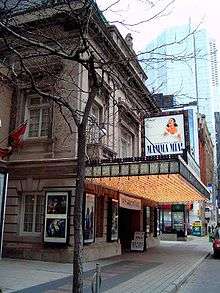 |
| Royal Conservatory of Music [57][58] | 1881 (Ihnatowycz Hall completed) | 1995 | Toronto 43°40′4.7″N 79°23′46.50″W / 43.667972°N 79.3962500°W |
Originally constructed as the first home of McMaster University, Ihnatowycz Hall has housed the Royal Conservatory of Music since 1962; some of Canada's some of the most prominent musicians and music teachers have studied at the Conservatory, and it has played a significant role in music education across the country |  |
| St. Anne's Anglican Church [59][60] | 1908 (completed) | 1996 | Toronto 43°39′2.24″N 79°25′50.35″W / 43.6506222°N 79.4306528°W |
The church contains a unique cycle of paintings, executed in 1923, by ten noted artists, including three members of the Group of Seven, under the supervision of J. E. H. MacDonald | |
| St. George's Hall (Arts and Letters Club) [61][62] | 1891 (completed) | 2007 | Toronto 43°39′28.13″N 79°22′57.51″W / 43.6578139°N 79.3826417°W |
Since 1920, St. George's Hall has been a gathering place for painters, writers, musicians, architects, actors and patrons of the arts; an important venue and catalyst for artistic activity in Canada | 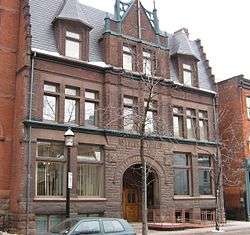 |
| St. Lawrence Hall [63][64] | 1850 (completed) | 1967 | Toronto 43°39′01″N 79°22′20″W / 43.65028°N 79.37222°W |
St. Lawrence Hall was for many years Toronto's chief social and cultural centre, and is among the finest 19th century public buildings in Canada |  |
| The Grange [65][66] | 1817 (completed) | 1970 | Toronto 43°39′11.25″N 79°23′32.7″W / 43.6531250°N 79.392417°W |
An historic Georgian manor in downtown Toronto, it is one of the few surviving residential estates belonging to prominent citizens from the settlement of York; the oldest remaining brick house in Toronto | |
| The Studio Building [67][68] | 1914 (completed) | 2005 | Toronto 43°40′24″N 79°23′10″W / 43.67325°N 79.386083°W |
An early Canadian artists’ studio in the modernist style, with associations with important Canadian artists including the Group of Seven; designed by architect Eden Smith for painter Lawren Harris, it contains six purpose-built studio spaces and, at one time, artists such as Tom Thomson, Arthur Lismer and Thoreau MacDonald lived and worked on site | 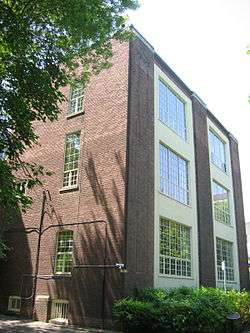 |
| Toronto Island Airport Terminal Building [69][70] | 1939 (completed) | 1989 | Toronto 43°37′55.01″N 79°23′44.65″W / 43.6319472°N 79.3957361°W |
Among the first group of airport terminals to be funded and approved by the then new Department of Transport as part of the development of Trans-Canada Air Lines; one of very few early terminal buildings to have survived and likely the oldest operating terminal of its kind in the country | 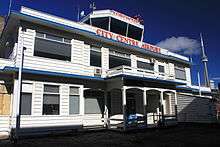 |
| Union Station (Canadian Pacific and Grand Trunk) [71][72] | 1927 (completed) | 1975 | Toronto 43°38′43″N 79°22′50″W / 43.64528°N 79.38056°W |
The finest example in Canada of classical Beaux-Arts railway stations, and the largest of the great urban stations built in the country during the early 20th century; illustrative of an era when railways were expanding and Toronto was becoming a modern metropolis |  |
| University College [73][74] | 1859 (completed) | 1968 | Toronto 43°39′44″N 79°23′45″W / 43.66222°N 79.39583°W |
One of the oldest collegiate buildings in the country, associated both with the development of non-denominational, publicly supported institutions of higher education in Canada, and with the development of the University of Toronto |  |
| Women's College Hospital [75][76] | 1883 (founded) | 1995 | Toronto 43°39′42″N 79°23′15″W / 43.661686°N 79.387497°W |
Founded at a time when women's access to medical education and hospital practice was extremely restricted, the hospital uniquely emphasizes women's health issues and women as health care providers; symbolic of the struggle and contribution of Canadian women to the medical profession | 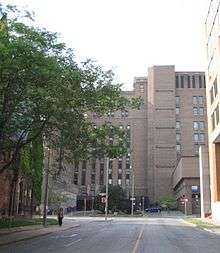 |
See also
| Wikimedia Commons has media related to National Historic Sites of Canada in Toronto. |
References
- ↑ Toronto, Directory of Designations of National Historic Significance of Canada
- ↑ Toronto, Directory of Designations of National Historic Significance of Canada
- ↑ Fort York, Directory of Designations of National Historic Significance of Canada
- ↑ "Bead Hill National Historic Site in Rouge Park," Friends of Rouge National Urban Park, March 31, 2015
- ↑ Annesley Hall, Directory of Designations of National Historic Significance of Canada
- ↑ Annesley Hall, National Register of Historic Places
- ↑ Balmoral Fire Hall, Directory of Designations of National Historic Significance of Canada
- ↑ Balmoral Fire Hall, National Register of Historic Places
- ↑ Bank of Upper Canada Building, Directory of Designations of National Historic Significance of Canada
- ↑ Bank of Upper Canada Building, National Register of Historic Places
- ↑ Bead Hill, Directory of Designations of National Historic Significance of Canada
- ↑ Bead Hill, Toronto National Historic Sites Urban Walks - Parks Canada
- ↑ Birkbeck Building, Directory of Designations of National Historic Significance of Canada
- ↑ Birkbeck Building, National Register of Historic Places
- ↑ Eaton's 7th Floor Auditorium and Round Room, Directory of Designations of National Historic Significance of Canada
- ↑ Eaton's 7th Floor Auditorium and Round Room, National Register of Historic Places
- ↑ Chapel of St. James-the-Less Anglican Church, Directory of Designations of National Historic Significance of Canada
- ↑ Chapel of St. James-the-Less Anglican Church, National Register of Historic Places
- ↑ Eglinton Theatre, Directory of Designations of National Historic Significance of Canada
- ↑ Eglinton Theatre, National Register of Historic Places
- ↑ Elgin and Winter Garden Theatres, Directory of Designations of National Historic Significance of Canada
- ↑ Elgin and Winter Garden Theatres, National Register of Historic Places
- ↑ Fort York, Directory of Designations of National Historic Significance of Canada
- ↑ Fort York, National Register of Historic Places
- ↑ Fourth York Post Office, Directory of Designations of National Historic Significance of Canada
- ↑ Fourth York Post Office, National Register of Historic Places
- ↑ George Brown House, Directory of Designations of National Historic Significance of Canada
- ↑ George Brown House, National Register of Historic Places
- ↑ Gooderham and Worts Distillery, Directory of Designations of National Historic Significance of Canada
- ↑ Gooderham and Worts Distillery, National Register of Historic Places
- ↑ Gouinlock Buildings / Early Exhibition Buildings, Directory of Designations of National Historic Significance of Canada
- ↑ Gouinlock Buildings / Early Exhibition Buildings, National Register of Historic Places
- ↑ Heliconian Hall, Directory of Designations of National Historic Significance of Canada
- ↑ Heliconian Hall, National Register of Historic Places
- ↑ John Street Roundhouse (Canadian Pacific), Directory of Designations of National Historic Significance of Canada
- ↑ John Street Roundhouse (Canadian Pacific), National Register of Historic Places
- ↑ Kensington Market, Directory of Designations of National Historic Significance of Canada
- ↑ Kensington Market, National Register of Historic Places
- ↑ Maple Leaf Gardens, Directory of Designations of National Historic Significance of Canada
- ↑ Maple Leaf Gardens, National Register of Historic Places
- ↑ Massey Hall, Directory of Designations of National Historic Significance of Canada
- ↑ Massey Hall, National Register of Historic Places
- ↑ Metallic Roofing Company Offices, Directory of Designations of National Historic Significance of Canada
- ↑ Metallic Roofing Company Offices, Toronto National Historic Sites Urban Walks
- ↑ Montgomery's Tavern, Directory of Designations of National Historic Significance of Canada
- ↑ Montgomery's Tavern, National Register of Historic Places
- ↑ Mount Pleasant Cemetery, Directory of Designations of National Historic Significance of Canada
- ↑ Mount Pleasant Cemetery, National Register of Historic Places
- ↑ Old Toronto City Hall and York County Court House, Directory of Designations of National Historic Significance of Canada
- ↑ Old Toronto City Hall and York County Court House, National Register of Historic Places
- ↑ Old Toronto Post Office / Old Bank of Canada, Directory of Designations of National Historic Significance of Canada
- ↑ Old Toronto Post Office / Old Bank of Canada, National Register of Historic Places
- ↑ Osgoode Hall, Directory of Designations of National Historic Significance of Canada
- ↑ Osgoode Hall, National Register of Historic Places
- ↑ Royal Alexandra Theatre, Directory of Designations of National Historic Significance of Canada
- ↑ Royal Alexandra Theatre, National Register of Historic Places
- ↑ Royal Conservatory of Music, Directory of Designations of National Historic Significance of Canada
- ↑ Royal Conservatory of Music, National Register of Historic Places
- ↑ St. Anne's Anglican Church, Directory of Designations of National Historic Significance of Canada
- ↑ St. Anne's Anglican Church, National Register of Historic Places
- ↑ St. George's Hall (Arts and Letters Club), Directory of Designations of National Historic Significance of Canada
- ↑ St. George's Hall (Arts and Letters Club), National Register of Historic Places
- ↑ St. Lawrence Hall, Directory of Designations of National Historic Significance of Canada
- ↑ St. Lawrence Hall, National Register of Historic Places
- ↑ The Grange, Directory of Designations of National Historic Significance of Canada
- ↑ The Grange, National Register of Historic Places
- ↑ The Studio Building, Directory of Designations of National Historic Significance of Canada
- ↑ The Studio Building, National Register of Historic Places
- ↑ Toronto Island Airport Terminal Building, Directory of Designations of National Historic Significance of Canada
- ↑ Toronto Island Airport Terminal Building, National Register of Historic Places
- ↑ Union Station (Canadian Pacific and Grand Trunk), Directory of Designations of National Historic Significance of Canada
- ↑ Union Station (Canadian Pacific and Grand Trunk), National Register of Historic Places
- ↑ University College, Directory of Designations of National Historic Significance of Canada
- ↑ University College, National Register of Historic Places
- ↑ Women's College Hospital, Directory of Designations of National Historic Significance of Canada
- ↑ Women's College Hospital, National Register of Historic Places